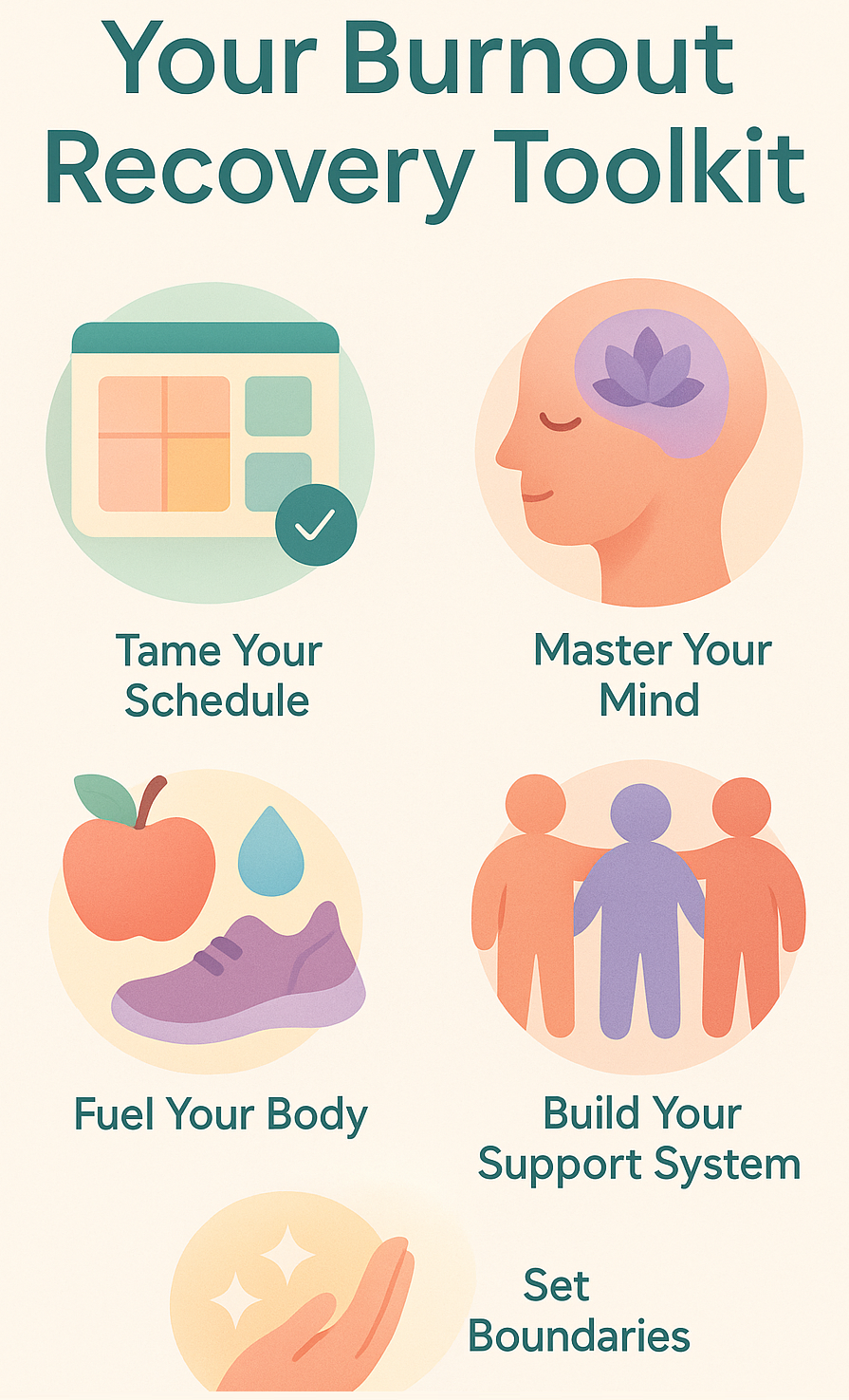It’s 1 AM on a Tuesday. You’re staring at a half-finished paper, fueled by coffee and the mounting dread of two exams later this week. Your chest feels tight, your thoughts are racing, and you can’t shake the feeling that you’re falling behind. If this sounds familiar, you’re not just “stressed.” You’re part of a growing crisis on college campuses.
The numbers are clear: according to a landmark Healthy Minds Study, a staggering 60% of college students meet the criteria for at least one mental health problem. This isn’t a personal failing; it’s a systemic issue. The pressure to succeed has never been higher and it’s taking a toll.
But this is not a story about despair. It’s a guide to fighting back. Burnout and anxiety are signals that something needs to change – and you have the power to make that change. This is your practical toolkit for navigating the chaos and reclaiming your well-being.
The Vicious Cycle: Why College Feels So Hard Right Now
Understanding the root cause of your stress is the first step to dismantling it. It’s rarely just one thing, but a web of interconnected pressures.
- The Academic Pressure Cooker: The demand for perfect grades in a competitive environment is the primary driver of burnout. With over 75% of students citing academics as their main source of stress, the cycle of intense coursework, exams and project deadlines can feel never-ending.
- The Digital Overload: Growing up online means you’re always connected. Social media creates a highlight reel of everyone else’s successes, feeding a culture of perfectionism and comparison that leaves many feeling inadequate. Meanwhile the 24/7 news cycle of global crises fuels what experts call “doomscrolling,” leading to increased anxiety.
- The Loneliness Epidemic: College is meant to be a social experience, yet a shocking 65% of students report feeling lonely on a regular basis, according to a recent Active Minds survey. This loneliness is a powerful driver of depression and anxiety, leaving students feeling disconnected when they need support the most.
- The Weight of Financial Stress: It’s hard to focus on your studies when you’re worried about tuition, rent and student loan debt. With two-thirds of students stressed about finances, the financial pressure adds another layer of anxiety to an already tough experience.This is a lot to handle, but you can break the cycle. Here’s a visual guide to your recovery toolkit.

Your Toolkit for Overcoming Burnout and Anxiety
Regaining control isn’t about a big life overhaul. It’s about making small strategic changes that create real momentum.
1. Tame Your Schedule (Before It Tames You)
Burnout often stems from feeling like you have too much to do and not enough time. The solution is structure and realistic expectations.
- Embrace the “Good Enough” Rule: Perfectionism is the enemy of progress. Not every assignment needs to be perfect. Identify the 20% of your work that requires your best effort and let the other 80% be just “good enough.”
- Set a “Closing Time”: Your brain needs rest. Designate a time each night (e.g. 10 PM) when you shut the laptop and stop all academic work. This creates a boundary that allows for real downtime.
- Break Down Your Tasks: A 15-page essay is daunting. Three pages a day for five days is doable. Break large projects into small concrete steps to reduce overwhelm and build momentum.
2. Master Your Mind (Not the Other Way Around)
Anxiety thrives on catastrophic thinking. By grounding yourself in the present and challenging negative thoughts you can reclaim your mental space.
- Use the 5-4-3-2-1 Grounding Technique: When you feel panic rising, interrupt the spiral. Pause and identify: 5 things you can see, 4 things you can feel, 3 things you can hear, 2 things you can smell and 1 thing you can taste. This simple exercise recommended by therapists and mental health professionals pulls you out of your head and back into your environment.
- Reframe Your Thoughts: Your inner critic can be your worst enemy. When you catch yourself thinking “I’m going to fail this exam” challenge it. Reframe it to something more constructive: “I’m worried about this exam so what’s one small thing I can do right now to prepare?”
- Practice Self-Compassion: According to expert Dr. Kristin Neff treating yourself with the kindness you’d offer a friend is a powerful tool against anxiety. Acknowledge that college is hard and it’s okay to struggle.Your physical health is the foundation of your mental well-being. You can’t expect your brain to function under pressure if you neglect its basic needs.
3. Fuel Your Body, Fuel Your Brain
- Sleep First: The CDC recommends 7-9 hours of sleep. It’s not a luxury; it’s a critical function for memory consolidation and emotional regulation. Consistent sleep is one of the best buffers against anxiety.
- Move Your Body: You don’t need to run a marathon. A simple 20-minute walk has been proven to reduce anxiety symptoms and improve mood. Think of it as a mental reset button.
- Eat for Energy: Sugary snacks and too much caffeine cause energy crashes that can mimic or worsen anxiety. Opt for balanced meals with protein and fiber to maintain stable energy levels throughout the day.
4. Build Your Support System
Loneliness is fuel for burnout. Connection is the antidote.
- Don’t Wait, Initiate: Don’t wait for the “perfect” time to connect. Send a text, schedule a 20-minute coffee break or sit with someone new in the dining hall. Small moments of connection add up.
- Vulnerability Is a Bridge: Sharing your struggles with a trusted friend can feel scary but often leads to a powerful response: “Me too.” Opening up builds deeper, more authentic friendships.
- Lean on Your Professors and RAs: If you’re overwhelmed, communicate. Visit a professor during office hours or talk to your Resident Advisor. They are often your first and best link to campus resources and can give you flexibility if you ask for help before you hit a crisis point.
5. Set Boundaries (Your Most Underutilized Superpower)
In a world that demands you be “on” 24/7, boundaries are not selfish – they are essential for survival.
- Digital Curfew: Designate a time each evening to silence notifications from email and class group chats. Allow your brain to fully disconnect from the demands of school.
- Learn to Say No: Your time and energy are limited. It’s okay to say no to extra commitments that will push you over the edge. Protecting your downtime is just as important as scheduling study time.
- Schedule “Oasis Moments”: Intentionally schedule short, enjoyable, non-productive activities into your day. This could be listening to a podcast on your walk to class, reading a chapter of a book for fun or just sitting in the sun for 10 minutes.
When to Get Help
Self-care strategies are powerful but sometimes they aren’t enough. Knowing when to reach out for help is a sign of strength. You should get help if your anxiety or low mood:
- Interferes with your ability to attend class, complete work or socialize.
- Is accompanied by frequent panic attacks.
- Leads you to use alcohol or other substances to cope.
- Includes thoughts of self-harm.
Start with your campus counseling center. Most colleges offer free or low-cost confidential therapy. It’s a smart, proactive step towards managing your mental health.
If You Are in Crisis:
If you are thinking of harming yourself, please reach out now.
- 988 Suicide & Crisis Lifeline: Call or text 988 anytime in the U.S.
- Crisis Text Line: Text HOME to 741741 to connect with a crisis counselor.
- In an emergency, call 911 or Campus Police.
Help is available 24/7. You are not alone.
Your Next Steps
College is harder than ever. Being burned out or anxious doesn’t mean you’re not cut out for this; it means you’re human. By acknowledging the struggle and using these strategies you are already taking the most important step.
As one student who overcame burnout said, “I overcame burnout by reassessing my study habits and taking more time to take care of my actual health. Don’t forget to take care of yourself.”
Take that advice to heart. Try one small strategy from this guide today. Be kind to yourself in the process. You are building a foundation not just for surviving college but for a healthier, more balanced life. You got this.
